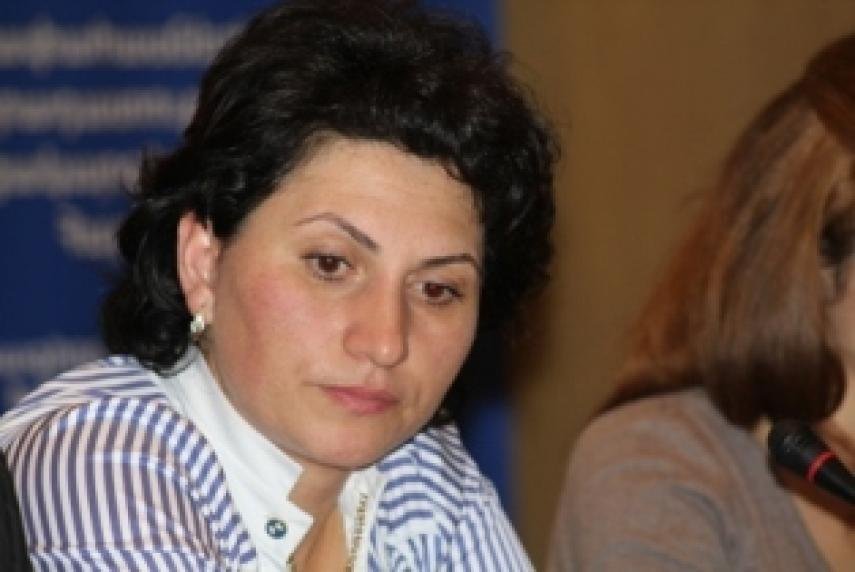NON-GOVERNMENTAL ORGANIZATION
There are many issues in the penitentiary institution for juveniles

«The penitentiary institution for juveniles shall be not the institution for punishment but, most importantly, a social institution, where people work on rehabilitation,” points out Arman Danielyan, president of Civil Society Institute NGO. In his opinion, juvenile justice in Armenia does not correspond to internationally accepted standards.
Civil Society Institute in March-April 2012 studied social -psychological activities and education process in the “Abovyan” penitentiary institution. On 19 November the research results were presented to the public.
The project's expert Laura Gasparyan firstly presented the general data about the “Abovyan” penitentiary institution (PI).
In the Abovyan PI at the moments of the research there were 32 juvenile, 16 of which were at the status of detainees, and 16- imprisoned. Out of the 32, there was only one girl, and 31 were boys.
The institution is divided into three sections, the section for detainees, where in different cells detained women and juvenile are kept, the section for imprisoned women and the section for imprisoned juvenile. Girls under 18 are kept with adult women.
The research revealed that there is only one psychologist, one social worker and one lawyer at the service to the whole institution. Their workload is tremendous, and working conditions are poor: their office rooms are not equipped, not heated, they do not have necessary material and technical resources and their salaries are low.
“We proposed (it was also mentioned by the workers of the social-psychological and legal department) that there is a need to increase the staff in this department”, noted Laura Gasparyan.
In the Abovyan PI there is an educational complex, which has a status of a special school. There are 7 teachers in the school, two of them teach three subjects each, and they have a heavy work schedule. The classes are grouped in the school.
“At the moment of the research only two classes operated: for juvenile of the age corresponding to the 7th -9th grades and the 9th -12th grades. But some children had problems even with the alphabet. In our opinion, there is a need for individual approach and education”, says the expert of the program.
The school has many problems: the building is not heated and in winter it is cold and dump there, the toilet is in an extremely poor condition, there is no running water, lack of chairs, and students seat by three persons at the tables designed for two, three is no sufficient books and stationary.
“The ministry of education is responsible to provide books and stationary to the school, but it transfers to the school only 30,000 dram per year”, says the expert. The deputy director of the educational part of PI Gayane Hovhakimyan adds, that this sum is envisioned by the budget for costs related to the teaching staff, and “no dime goes to the charged or imprisoned persons.”
The staff of the institution during interviews mentioned that they try to raise funds from other sources, but according to the expert's opinion this is only initiatives of good will and one day they may end. The school needs to cared for and protected by the state.
Civil Society Institute has requested information about this issue from the Ministry of Education and Science and the Ministry of Justice, and received answers from the both institutions that this does not fall within their responsibilities.
Other issues were discovered in respect to organization of educational process for juvenile who are kept at the pre-trial isolator. Teachers do not receive salary for teaching those who are kept in the isolator. The detained juvenile cannot attend the classes organized for the imprisoned, and teachers to give classes to the detainees have to visit them in the isolator. There is no strict schedule, and the teachers agree with each other spontaneously on their turns to teach in the isolator.
Laura Gasparyan notes that the Abovyan PI is problematic with giving a choice for occupation: “They do not have anything to do except for classes. During summer they spend time playing in the yard, and during winter they have nothing to do. We proposed that, at least, they can prepare for classes, as until now no home work was assigned to them.”
The rest and leisure are also not organized, and this problem is especially acute in winters, when it is cold both inside and outside of the building.
The research expert also shares her concerns about the future of the imprisoned juveniles. The penitentiary institution looks after released persons only during the first month. “There is no service which deal with the child's further destiny, living, and integration,” says Laura Gasparyan.
The head of social-psychological and legal department of the Abovyan PI Nouneh Mikaelyan admits that they have many issues, but also adds that the specialists there make any effort to do whatever possible.
“Everyday, the psychologist and social worker visit both imprisoned and detained juvenile and women, they organize individual consultations. At every holiday we try to organize some events. We have sport, culture, educational and religious units, and children decide what program they want to present and realize” says Ms. Mikayelyan, mentioning that all the issues will be solved after the renovation which they expect to carry soon.
The research was prepared by the Civil Society Institute with support of Penal Reform International and in cooperation with experts of the office of the RA Human Rights Defender.

